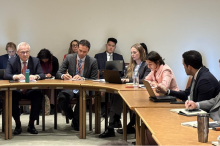Displaying 1 - 10 of 741
UNREC deploys an assessment mission to Ghana for the SALIENT Fund Technical Review Meeting
Group photo of the SALIENT Fund Technical Review Meeting with UNREC Director and UNDP Ghana Deputy Resident Representative Accra, 14 August 2025: The United Nations Regional Centre for Peace and Disarmament in Africa (UNREC) concluded a strategic assessment mission to Ghana. The mission aimed to evaluate the status of the “Saving Lives Entity” (SALIENT) project, a flagship initiative dedicated to addressing armed violence and the illicit proliferation of small arms and light weapons (SALW). The SALIENT Fund, a joint effort between the United Nations Office for Disarmament Affairs…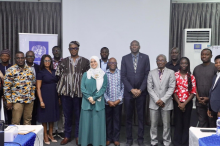
Burundi Validates its National Action Plan to Combat the Illicit Proliferation of Small Arms and Light Weapons
Bujumbura, 25 November 2025: In response to the security challenges posed by the illicit proliferation of small arms and light weapons (SALW) in the Great Lakes region, Burundi continues to strengthen its national arms control framework. In this context, a National Validation Workshop of the National Action Plan (NAP) to Combat the Illicit Proliferation of SALW was held on 25 November 2025 in Bujumbura, at the Hotel Club du Lac Tanganyika. The workshop brought together 25 participants, including representatives from the National Commission on SALW, relevant line ministries, defense and…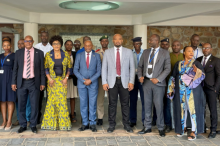
Charting pathways to strengthen armed violence prevention in West Africa
Version française ci-dessous On 26-27 November, the United Nations Institute for Disarmament Research (UNIDIR) and the United Nations Regional Centre for Peace and Disarmament in Africa (UNREC) and the Swiss Federal Department of Foreign Affairs (FDFA) convened a workshop in Lomé, Togo, to consider and chart the implementation of a study on integrating the prevention of violent extremism and illicit weapons proliferation. The event brought together over 50 West African experts from States, the UN, regional and continental organizations, civil society and academia. In recent years,…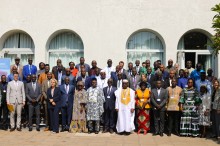
The BWC at 50: African Conference Highlights Progress, Challenges and the Road Ahead
From 26 to 28 November 2025, the United Nations Office for Disarmament Affairs (UNODA), in partnership with the Government of Kenya, held the first African Conference on the Biological Weapons Convention (BWC) in Nairobi, Kenya. The landmark event, held in the year of the 50th anniversary of the BWC, was the largest ever gathering of African States parties to the BWC and showcased the region’s growing leadership on issues related to disarmament and biosecurity. The conference was attended by 140 delegates, including officials from 47 African States Parties, three African States not…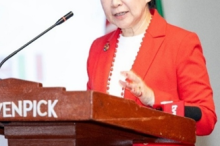
Training Course for UNSCR 1540 Points of Contact in Latin America and the Caribbean Held in Panama City, Panama
From 15 to 17 December 2025, the United Nations Office for Disarmament Affairs, together with the Government of Panama and the Security Council Committee established pursuant to resolution 1540 (2004), convened a ‘Training Course for UNSCR 1540 Points of Contact (PoCs) in Latin America and the Caribbean in Panama City, Panama. This event marked the first comprehensive 1540 PoC training for Latin America and the Caribbean since 2016, following a regional course in Chile that year, as well as the dedicated training for CARICOM States in 2019. The 2025 course brought together…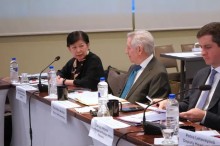
China and Malaysia co-hosted the Second Regional Workshop on Implementing the Biological Weapons Convention and Promoting Biosafety and Biosecurity in Southeast Asia
The Governments of the People’s Republic of China and of Malaysia co-hosted the “Second Regional Workshop on Implementing the Biological Weapons Convention and Promoting Biosafety and Biosecurity in Southeast Asia” from 18 to 20 November 2025 in Guangzhou, Guangdong Province, China. The workshop was supported by the United Nations Office for Disarmament Affairs (UNODA) through the Implementation Support Unit (ISU) of the Biological Weapons Convention (BWC) and the United Nations Regional Centre for Peace and Disarmament in Asia and the Pacific (UNRCPD). Furthermore…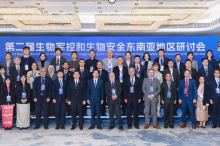
African States Explore Incentives, Challenges and Solutions to Advancing Strategic Trade Management of Dual-Use Items to Prevent WMD Proliferation
From 2 to 4 December 2025, the United Nations Office for Disarmament Affairs (UNODA), in partnership with the Republic of South Africa, the European Union Partner-to-Partner Export Control Programme for Dual-Use Goods (EU P2P), and the German Federal Office for Economic Affairs and Export Control (BAFA), convened a Regional Workshop on Strategic Trade Management of Dual-Use Items at the South African Department of International Relations and Cooperation in Pretoria. The workshop marked a significant step toward strengthening regional capacities to develop and sustain effective systems…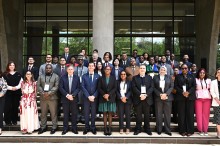
UNODA Vienna Marks 25 Years of Women, Peace and Security
2025 marks a year of important anniversaries in the global effort to achieve gender equality. The UNODA Vienna Office celebrated the 25th anniversary of Security Council Resolution 1325 and the Women, Peace and Security (WPS) agenda with an inspiring photo exhibition titled “Women, Peace and Security at 25: From Global Commitment to Lasting Change.” The exhibition took place at the Vienna International Centre from 3 to 7 November 2025. Organized in collaboration with Vienna-based partners - CTBTO, UNODC, UNIDO, UNOOSA - and the OPCW, the event highlighted how women continue to shape…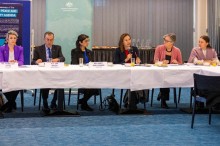
Young Women Active in Biosecurity Participate in Fellowship Programme
The Young Women for Biosecurity Fellows take part in the in-person segment of the programme in Geneva, Switzerland. This year marks the 50th anniversary of the entry-into-force of the Biological Weapons Convention (BWC). To commemrorate the milestone, the UN Office for Disarmament Affairs’ (UNODA) Geneva Branch launched a special edition of the Youth for Biosecurity Initative to engage a group of ten young women scientists from the Global South on topics related to the BWC. The programme included online webinars and an immersive in-person study visit in December 2025. It was made…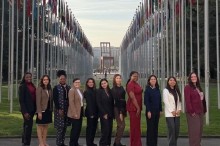
Briefing by the Chair of the CCW GGE on LAWS on the margins of the First Committee
On 23 October, the Kingdom of the Netherlands held a side-event on the margins of the United Nations General Assembly First Committee to present the ongoing work undertaken by the Group of Governmental Experts on Lethal Autonomous Weapons Systems (GGE LAWS) within the framework of the Convention on Certain Conventional Weapons (CCW). During this side-event, the Chair of the GGE LAWS, Ambassador Robert in den Bosch of the Kingdom of the Netherlands briefed participants on the Group’s efforts to address the growing international concerns around the ethical, legal and humanitarian…